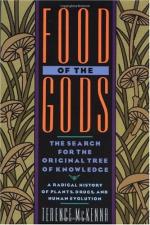|
This section contains 522 words (approx. 2 pages at 400 words per page) |

|
Food of the Gods: The Search for the Original Tree of Knowledge Summary & Study Guide Description
Food of the Gods: The Search for the Original Tree of Knowledge Summary & Study Guide includes comprehensive information and analysis to help you understand the book. This study guide contains the following sections:
This detailed literature summary also contains Topics for Discussion and a Free Quiz on Food of the Gods: The Search for the Original Tree of Knowledge by Terence McKenna.
"Food of the Gods: The Search for the Original Tree of Knowledge" is a book examining human history and its relationship to psychoactive plants and substances. The author provides evidence and arguments for hallucinogenic plants playing a role in human evolution, particularly that of growing self-reflection. The book also explores the recent uses of drugs by humans and argues for a reappraisal of human's relationship to plants and nature.
McKenna begins by painting the picture of "paradise" - how our human ancestors connected to nature and how this relationship allowed for human evolution. Our ancestors were likely opportunists, foraging and consuming any food-like plant, especially during times of scarcity. If they consumed hallucinogenic mushrooms, they would have enjoyed increased visual acuity resulting in hunting and gathering success, greater food supplies and increased reproductive fitness. In addition, mushroom consumption supported a spiritual connection with plants, fostered a sense of community, and served as a catalyst for human self-reflection. Shamanic rituals, which often include the use of intoxicating plants, pay homage to this ancient relationship.
Although our ancestors enjoyed a period of peace and equality, this did not last for long. Other refined intoxicants began to replace the plant-based ones. Alcohol and fermented honey were two such examples. Cannabis, commonly known as hashish, was another popular substance. McKenna notes that during this time, social attitudes and values were also beginning to change. Wine for example, had a tendency to suppress the feminine, with women in Ancient Rome not even allowed to imbibe wine.
However, McKenna argues that more recent drugs were more destructive to humanity for endorsing dominator styles. He also notes the hypocrisies that exist in attitudes towards drugs, noting the substances such as tobacco are widely accepted and legalized, despite their clear connection to diseases and poor health outcomes, while opium is not. McKenna also introduces unconventional addictions, such as sugar, caffeine and television. Sugar is particularly damaging, as its use is unnecessary and its production created slave trade. Caffeine is noted as the only drug with acceptable addiction rituals (e.g. coffee break), and television is touted as an addiction with the most amount of converts and with the least stigma. Other synthetics, such as heroin and cocaine, have only added to dominator styles through racial politics.
McKenna concludes the book by advocating a return to archaic ways and a symbiotic relationship with plants. He presents a short history of psychedelics and how their incorporation into modern living could have great benefits. He also proposes solutions for the "drug problem," noting that mismanagement of drug use will remain, as long as the experimentation of boundary testing of psychoactives is not allowed. He argues that a democratic society should aim to educate people to make informed choices about their own needs and ideals. The legalization of drugs is just one solution. He also notes that these substances should be taxed and other related policies regarding guns and banking should be strengthened. Only then, he argues, can humans return to a time of self-reflection, a partnership with other living organisms, and an understanding of their place in the world.
Read more from the Study Guide
|
This section contains 522 words (approx. 2 pages at 400 words per page) |

|



